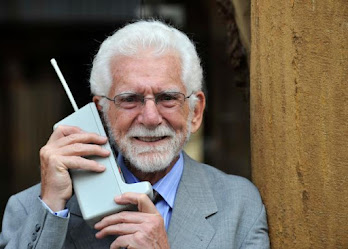How Martin Cooper's Invention of the Mobile Phone Changed Our Lives and Our Brains
In today's world, mobile phones have become an integral part of our lives. We use them for communication, entertainment, and even work. But have you ever wondered how this technology came to be? It all started with one man's vision – Martin Cooper.
Martin Cooper is known as the father of the mobile phone. In 1973, he made the first-ever call on a mobile phone. The phone was developed by Motorola, where Cooper was working at the time. The device weighed over two pounds and had a battery life of just 20 minutes. But it was a major breakthrough in technology.
Before the invention of the mobile phone, telephony was limited to landlines. People had to be in a specific location to make or receive a call. But with the mobile phone, communication became mobile. People could talk on the phone while on the move. This changed the way we communicate and interact with each other.
The first mobile phones were expensive and bulky. They were primarily used by businessmen and executives. But over time, mobile phones became more affordable and accessible to the general public. Today, there are over 7.9 billion mobile phone users in the world.
Mobile phones have transformed our lives in many ways. They have made communication easier and faster. They have also changed the way we work, shop, and entertain ourselves. But what effect have they had on our brains?
Studies have shown that mobile phones have changed the way our brains function. For instance, we have become more reliant on our phones to remember things. Instead of trying to remember something, we simply look it up on our phones. This has led to a decline in our memory and cognitive skills.
Mobile phones have also changed the way we socialize. Instead of having face-to-face conversations, we rely on social media and messaging apps to communicate. This has led to a decline in our ability to read social cues and body language.
Moreover, mobile phones have also affected our sleep patterns. The blue light emitted by phone screens can disrupt our sleep cycle, making it harder to fall asleep at night. This can lead to insomnia and other sleep-related disorders.
One of the most notable changes that mobile phones have brought about is the rise of instant gratification. We are now accustomed to receiving instant responses to our messages and requests. This has created a culture of impatience where we expect things to happen instantly. This can lead to frustration and anxiety when we are unable to get what we want immediately.
Mobile phones have also had an impact on our attention spans. With a constant stream of notifications and distractions, it has become harder to focus on tasks for extended periods. This can affect productivity and our ability to learn and retain information.
Another area where mobile phones have had a significant impact is on our mental health. Social media and messaging apps have created a culture of comparison and FOMO (fear of missing out). We often compare ourselves to others online, which can lead to feelings of inadequacy and low self-esteem. This can also lead to addiction and dependency on our phones, which can have a negative impact on our mental health.
However, mobile phones have also brought about many positive changes. They have made it easier to stay connected with loved ones, especially those who live far away. They have also made it easier to access information and education. Mobile phones have also played a crucial role in emergency situations, allowing people to call for help quickly and easily.
Mobile phones have had a profound impact on our lives, both positive and negative. They have changed the way we communicate, work, and socialize. However, as with any technology, it's important to use them responsibly and be aware of their effects on our physical and mental health. By doing so, we can continue to enjoy the benefits of mobile phones while minimizing their negative impact on our lives.
In conclusion, Martin Cooper's invention of the mobile phone has changed our lives in many ways. Mobile phones have revolutionized the way we communicate, work, and entertain ourselves. But they have also had a profound effect on our brains. As we continue to use mobile phones, it's important to be mindful of their effects and use them in a way that enhances our lives, rather than detracts from them.







No comments